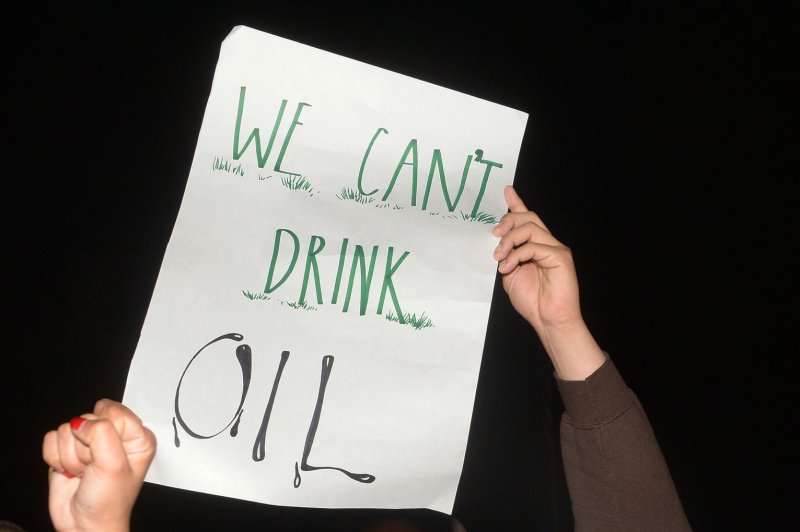Opponents of the Keystone XL oil pipeline said TransCanada still doesn't have the industry support that would warrant construction. Photo by Jim Ruymen/UPI |
License Photo
Jan. 19 (UPI) -- Opponents of the Keystone XL oil pipeline from Canada through the United States scoffed at planner TransCanada's take on industry commitments.
TransCanada said Thursday it concluded the open season for commercial commitments to fill the Keystone XL pipeline. With 500,000 barrels per day in firm commitments for the next 20 years, TransCanada said the proposed project was positioned to proceed.
Thursday's announcement on commercial commitments was unchanged from a third quarter update. The 20-year commitments represent about 60 percent of the total design capacity.
Patrick McCully, an energy program director for the Rainforest Action Network, said in an emailed statement that TransCanada clearly hasn't shown the industry is ready to fill up the pipeline.
"It's just bluster from TransCanada to pretend that this unnecessary and unwanted pipeline is close to proceeding," he said. "It still faces enormous regulatory and legal hurdles and continued fierce opposition from landowners, farmers, indigenous peoples, and activists alike."
Kelly Martin, a campaign director at the Sierra Club, said TransCanada's announcement was a distraction from the long process it still faces in getting the pipeline built.
"They still face significant headwinds towards ever making their Keystone XL pipe dreams a reality," she said in a statement.
Regulators on the Nebraska Public Service Commission in November sided against the preferred route for Keystone XL, saying TransCanada's preferred route would've spoiled the ecological sensitive Sandhills region in the state. The PSC said parts of the pipeline would be exposed and therefore vulnerable if TransCanada built the $8 billion pipeline as planned.
TransCanada said in the past the alternate route was unworkable. The company is still facing legal challenges as well from landowners seeking legal fees and court costs from TransCanada's claim on eminent domain.
The Sierra Club added that a lawsuit is challenging a decision from the State Department under President Donald Trump that approved the pipeline, a case that could take several years to resolve.
The pipeline's progress was stimulated when Trump took office last year and used the power of the executive office to facilitate North American oil and gas infrastructure.
A decision drafted in 2015 by the State Department under U.S. President Barack Obama said there were questions about the necessity for additional North American pipeline capacity given uncertainties about the future growth of Canadian oil sands production.
Crude oil production gains in the United States could strain existing infrastructure and Keystone XL would carry oil from oil sands in Alberta along with some shale oil from the Bakken formation in North Dakota.
In mid-September, TransCanada called on Canada's National Energy Board to suspend its review of the Energy East oil pipeline project after the regulator published a lengthy list of issues ranging from greenhouse gas emissions to the risk of an oil spill that could determine whether the project was in the public interest. The company later pulled the project from consideration.
TransCanada said it was reaching out to the communities where Keystone XL will be built and working with landowners to get the necessary easements for the approved route.
Preparation for construction is under way and TransCanada said the primary work is set to begin next year.















